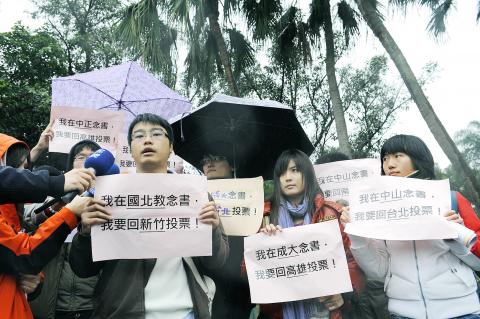Dozens of college students yesterday rallied outside National Taiwan University (NTU), calling on the government to provide assistance with transportation so they can return home to vote on Jan. 14, as election day falls in the final week of exams for many students.
Holding signs showing their school names and their home towns, such as: “I study at NTU, I have to go back to Kaohsiung to vote,” “I study at National Chung Cheng University, I have to go back to Hualien to vote” and “I study at NSYSU [National Sun Yat-sen University], I have to go back to Nantou to vote,” students attending universities that are far away from their hometowns protested outside the main NTU campus in Taipei.
National Chung Cheng University is in Chiayi County, while National Sun Yat-sen University is in Greater Kaohisung.

Photo: George Tsorng, Taipei Times
According to the Election and Recall Act of Public Servants (公職人員選舉罷免法), voters can only cast their ballots at designated polling centers near their registered home addresses, making it difficult for people studying or working away from home to vote.
“Setting Jan. 14 as polling day [for the presidential and legislative elections] is a decision that overlooks the rights of students studying away from their home towns to begin with because it’s the final exam period for most students. Some even have to turn in their semester papers around that date,” said Chen Ting-hao (陳廷豪), a student at National Taipei University of Education’s department of educational management.
Few students would be willing to take their assignments or books home just to vote, he said.
Chiang Yu-hsin (江昱欣), a master’s student at NTU’s Graduate Institute of National Development, said he had to take a final exam on the day before the elections.
“Then, I’ll have to take a late-night train or highway bus back to Kaohsiung so that I can vote the next day,” he said.
“I’m lucky enough to have my final on Jan. 13, some of my friends have their finals on Jan. 14 and they just have to give up their right to vote,” Chiang said.
The students urged the government to provide transportation for students who want to go home to exercise their right to vote and for the Ministry of Education to check if there are any schools that require their students to take their finals or to turn in their papers on polling day.

The High Prosecutors’ Office yesterday withdrew an appeal against the acquittal of a former bank manager 22 years after his death, marking Taiwan’s first instance of prosecutors rendering posthumous justice to a wrongfully convicted defendant. Chu Ching-en (諸慶恩) — formerly a manager at the Taipei branch of BNP Paribas — was in 1999 accused by Weng Mao-chung (翁茂鍾), then-president of Chia Her Industrial Co, of forging a request for a fixed deposit of US$10 million by I-Hwa Industrial Co, a subsidiary of Chia Her, which was used as collateral. Chu was ruled not guilty in the first trial, but was found guilty

DEADLOCK: As the commission is unable to forum a quorum to review license renewal applications, the channel operators are not at fault and can air past their license date The National Communications Commission (NCC) yesterday said that the Public Television Service (PTS) and 36 other television and radio broadcasters could continue airing, despite the commission’s inability to meet a quorum to review their license renewal applications. The licenses of PTS and the other channels are set to expire between this month and June. The National Communications Commission Organization Act (國家通訊傳播委員會組織法) stipulates that the commission must meet the mandated quorum of four to hold a valid meeting. The seven-member commission currently has only three commissioners. “We have informed the channel operators of the progress we have made in reviewing their license renewal applications, and

Taiwan People’s Party (TPP) Chairman Huang Kuo-chang (黃國昌) yesterday appealed to the authorities to release former Taipei mayor Ko Wen-je (柯文哲) from pretrial detention amid conflicting reports about his health. The TPP at a news conference on Thursday said that Ko should be released to a hospital for treatment, adding that he has blood in his urine and had spells of pain and nausea followed by vomiting over the past three months. Hsieh Yen-yau (謝炎堯), a retired professor of internal medicine and Ko’s former teacher, said that Ko’s symptoms aligned with gallstones, kidney inflammation and potentially dangerous heart conditions. Ko, charged with

Taiwan-based publisher Li Yanhe (李延賀) has been sentenced to three years in prison, fined 50,000 yuan (US$6,890) in personal assets and deprived political rights for one year for “inciting secession” in China, China's Taiwan Affairs Office spokesman Chen Binhua (陳斌華) said today. The Shanghai First Intermediate People’s Court announced the verdict on Feb. 17, Chen said. The trial was conducted lawfully, and in an open and fair manner, he said, adding that the verdict has since come into legal effect. The defendant reportedly admitted guilt and would appeal within the statutory appeal period, he said, adding that the defendant and his family have